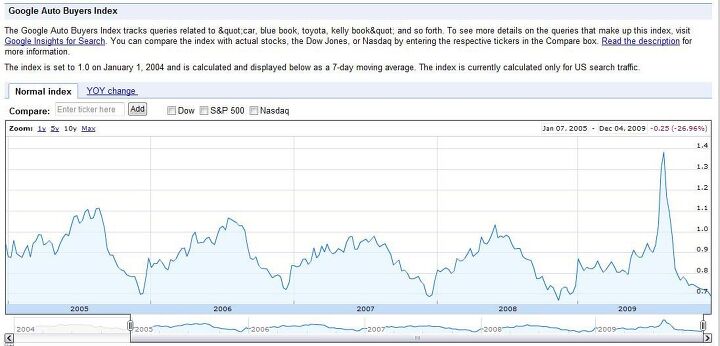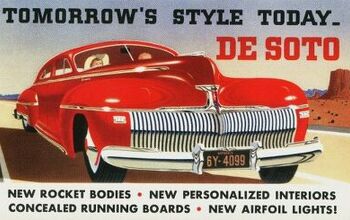1 View
What's Wrong With This Picture: Clunker Crunch Edition
by
Edward Niedermeyer
(IC: employee)
Published: December 7th, 2009
Share
From the Calculated Risk Blog comes this manifestation of the cash-for-clunker boom, as measured by Google’s auto buyer index. Because of seasonal downturn, it seems that pull-forward may not have been as devastating as was once thought. But will next January see the usual post-holiday recovery again?
Edward Niedermeyer
More by Edward Niedermeyer
Published December 7th, 2009 9:55 AM


































Comments
Join the conversation
This just in: "Nero fiddles, Rome continues to burn....." There are a finite number of consumers at any point in time with the desire or need for a new vehicle. Of this group, there is a finite number of people with the means necessary to buy/finance a new vehicle purchase. C4C undeniably plucked some of those buyers, who likely would have purchased in early 2010, and sucked their sale into the 3rd quarter of 2009. It is unlikely in extremis that C4C convinced any consumers who would not have otherwise purchased a new vehicle to do so. Anyone who argues that C4C did anything other than pull ahead sales, at the expense of future sales, is in near-pathological denial.... We are entering a glacial period, where nearly all auto sales will be on a "emergency replacement" basis....gone are the days of the automatic, every-4-to-5-year replacement cycle for most American consumers. Instead of keeping UP with the Jones, Mr. and Mrs. America are trying to keep AHEAD of their mortgage lenders in an era when KEEPING your job at your CURRENT salary is the new "annual C.O.L raise"....
I'm not in favor of cash for clunkers schemes. But not because of pull-forward. Did people think that pull-forward would be devastating? I don't see it.
Look, no one really knows. That's part of why the overheated official response of the White House to some estimates was so silly. As the economists who prepared the White House estimate admitted, we don't know; we'll know more later, but it will always be hard to know what would have happened without the program. I think that the program mostly gave money to people who would've bought a new car at some point relatively soon, and that a lot of the rest went to people who cut down on spending elsewhere and thus didn't stimulate the economy. Perhaps something worse about it is that the money went to upper middle-class people who could buy new cars, but by destroying the old cars it raised used car prices and made people who buy used cars (which skews poorer than new car buyers) worse off. Is regressive policy the right approach?
I suspect people's spending habits will be smarter, rather than lessened. Of course, that's just a guess, but if it pans out you should expect to see smaller cars and greener cars and less-expensive cars getting the sales going forward -- but overall no notable long-term reduction in sales. Theoretically, short-term slumping sales would be people strongly aware of upcoming smaller/greener/less-expensive choices (volt, leaf, fiesta, et al) and so are going to hold out.